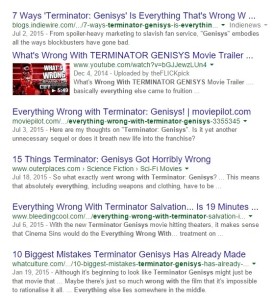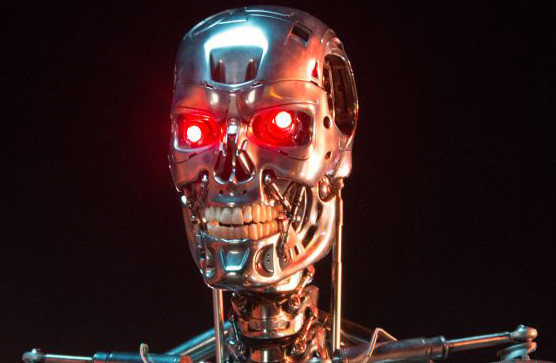[SPOILERS AHEAD]
There are many scathing writings about the film ->
and I will try not to rehash the obvious problems like:
Time paradox that John should not exist.
Why doesn’t John immediately kill Sarah and Kyle?
Why doesn’t the new mimetic terminator kill John and/or Kyle before they can use the time machine, thus thwarting their entire plan? Was he just hanging around waiting to strike a dramatic pose?
On to the fun.
The time paradox. OK I will say a bit about this, but not so much because it is logically nonsensical- all of the Terminator films have that problem. The problem here is even the superficial plot makes no sense, and all of the characters know it. There are multiple timelines that somehow now intersect and influence each other. The viewer (and characters) has no idea what the rules are, and worse, it isn’t clear that anything the characters do really matters because the timeline can just be departed, altered, or annihilated at any moment. As the viewer you know this because you see it happen. This kills dramatic tension. We don’t know what world or what version of characters and events matter. What should we care about? Beats me.
There’s no reason John or Kyle should be experts in conventional weapons. Adult John Connor rises to prominence thanks to time-paradox future knowledge of terminators. But wait, the terminators are relatively invulnerable to conventional firearms and most explosives. Kyle Reese, John’s ward and eventual lieutenant, was trained entirely in the use of post-machine war weapons. Some sort of special arms, armor, and devices that are effective against cyborgs. In Genisys, as well as the original Terminator film, we see Reese loading ammo clips using a variety of common 20th century guns. He’d never have seen these weapons before. He’d never have used any of them- they don’t work in his war. In Genisys it’s worse because we can see Kyle was not trained in any way for his mission. It was a snap decision he made minutes before leaving.

John’s confused speech. In the opening speech, John says “The machines think that we cannot win.” Except that his plan is to get to the secret basement and stop the doomsday weapon that the machines have reserved explicitly as a last-ditch effort to save themselves from total destruction at the hands of the humans. Later Kyle even says, “they knew they were losing”. So which is it? A hopeless uphill battle, or an almost-won war in which the machines are getting handily bested? It can’t be both at the same instant.
The machines are unbelievably stupid even as their AI becomes god-like. There are a couple of points here.
- As Genisys/Skynet is coming online, every human is anxious to welcome the Genisys OS into their every smartphone, PC, tablet, toaster, etc.., The humans enthusiastically welcome this level of integrated connectedness and technological capability. Naturally, the machine AI immediately decides they must all be annihilated. Presumably, on fear of being hugged to death?
- As Genisys/Skynet is coming online, there isn’t a single State vs State war on earth and all trends are toward peace and stability. Naturally, the machine AI immediately decides humans are an incorrigible threat that must be annihilated immediately. It never occurs to the machines, even the super-smart T:Genisys AI, that peaceful coexistence is an option, even after…
- It notices that it always loses. The future is always a pointless, endless war against resilient, clever humans who always find a way to stop them. In every timeline, the machines are losing the war. Hey super-smart AI, how about maybe you stop judgement day? You’re not the judge in that metaphor.
Kyle distrusts “pops” for no reason. Pops had decades to kill (initially) pre-teen Sarah, precluding the possibility of either John or Kyle ever existing and definitively ending the war. The writers want there to be interesting tension between Sarah’s two protectors, but it makes no sense at all.
The heroes have numerous chances to destroy Skynet-John, but don’t. Instead they incapacitate him, then depart the scene, as if preparing for the next vignette. Skynet-John can be reduced to a soup-y pile of metallic bits. So uh, why not just cut off his head, put it in a sealed plastic box. Then keep doing that until his mass is split into 10 or 20 boxes, and if you can’t destroy that kind of matter, just cart the boxes far away from each other.
Hyper-connected 2017 Genisys is inexplicably locked in one server building. They try to explain this as Genisys being “born” or growing like a child and thus, not ready to go “live” until the countdown is done. But uh, why would you prepare to launch a software product, globally, mind you, before it’s been tested even once? That’s like McDonald’s taking a recipe that sounds super-good and sending it to the restaurants before anyone’s ever seen the food made one time. Beyond that, Genisys will be inherently connected. The hardware is actually meaningless to it, it will be everywhere. Then why can’t it initially start out from a “test zone” comprised of several highly-connected facilities separated by many miles? Surely John would have seen the obvious advantage to not having a single point of failure. He knew there would be a Terminator, Sarah, and Kyle coming to stop him.
Sarah Connor is irritated at her lack of choices. We all want to feel in control. But we also want to lead meaningful lives and leave a legacy that matters. In Genisys, Sarah does many things that deliberately imperil the future as she knows it. I can understand her compunction and maybe dismay, but seriously, how selfish and terrible a person do you have to be to privilege your most capricious possible choices over the survival of all mankind? And to make it even more absurd, the future in which she has John Connor, was a result of all of her “previous” choices, the things she herself wanted to do. She’s rebelling against her own decisions on the basis that they are not sufficiently unknown for her liking, and that trivial bit of uncertainty is worth risking the survival of the species over. Sarah is the worst person who has ever lived.
